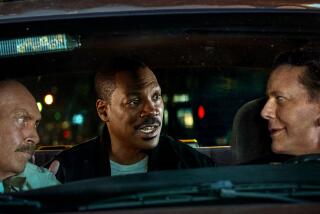A look inside Hollywood and the movies. : WRITING CREDITS : The Mystery of ‘Those’ Words
- Share via
The screenwriters of the Eddie Murphy movie “Boomerang” say they had nothing to do with a scene in the movie that has angered many Korean-Americans.
“The first time I heard about the scene and the offensive lines was when I read about them in the newspaper,” says co-screenwriter Barry W. Blaustein, referring to the scene in which Halle Berry mumbles in Korean and then translates the phrase for co-star David Alan Grier’s benefit: “That means I’m sorry I shot you, but I thought you were robbing the store.”
The reference is to the March, 1991 incident in which a Korean grocer fatally shot 15-year-old Latasha Harlins after a fight that started when the grocer accused Harlins of shoplifting from her market in South-Central Los Angeles. The case ignited a furor, and emotions intensified when the grocer was convicted of voluntary manslaughter and not sentenced to jail.
Blaustein says that although he had seen the movie a number of times prior to its release, he didn’t know that the line had been added. “Each time I saw the movie with an audience, they laughed so hard when she started speaking Korean, that I didn’t realize that there was a line afterward,” says Blaustein, who insists that director Reginald Hudlin added the line. (Hudlin did not return a reporter’s phone calls.)
“I would’ve preferred that it wasn’t in,” he continues. “I don’t think it’s in character for them to say that and I think it makes light of a serious situation, without shedding any light on it. It exploits it.”
Murphy’s response to the complaints about the line from the Korean-American community came in a press release that states, in part: “We recognize your (the community’s) concerns, but ‘Boomerang’ is a comedy that explores satirically a number of aspects that affect modern life, between men and women and among races. The line of dialogue that offended members of the Asian-American community deals with a serious issue that actually happened. Theater has always provided a forum to explore real-life issues in a less threatening environment. If we avoid addressing racial tragedies, they’ll never end. We have to bring them to the forefront for discussion, which will allow the healing process to begin. Then and only then can we live together in peace.”
More to Read
Only good movies
Get the Indie Focus newsletter, Mark Olsen's weekly guide to the world of cinema.
You may occasionally receive promotional content from the Los Angeles Times.







